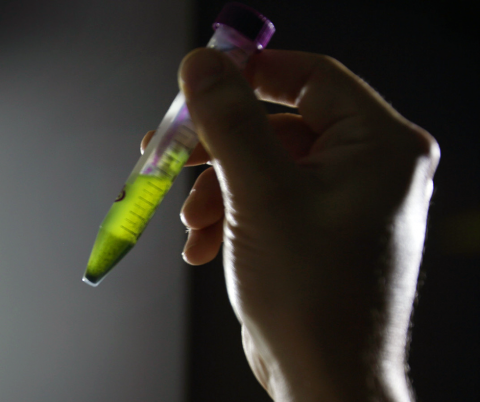Optimization of Microbiomes for Large-Scale Algae Cultivation (2023-2024)
Atmospheric carbon dioxide (CO2) concentrations continue to rise, with substantial negative impacts to the environment and societies across the globe. Beyond just reducing future emissions, Intergovernmental Panel on Climate Change projections demonstrate that active CO2 removal technologies will be needed to maintain the climate within tolerable levels.
With their fast growth and utilization of atmospheric/oceanic carbon dioxide, marine microalgae may offer multiple solutions to this grave societal challenge. This project built on a large Department of Energy-funded project called MAGIC (Marine Algae Industrialization Consortium), in which marine microalgae are being grown at commercially relevant scales toward the sustainable production of numerous bioproducts and durably sequestering carbon dioxide.
This team characterized the variability of existing microbiomes in the context of different environmental conditions. Team members collected new data and analyzed specific microbial populations using Bayesian Generalized Joint Attribute Modeling.
Next, team members isolated microbes (bacteria) from open-pond data that have predicted “probiotic” properties and tested them at the laboratory scale to determine the impact of these interactions on growth and yield. From this screening, team members selected one or more bacteria for a similar outdoor trial.
Ultimately, samples from both laboratory and open pond trials will be analyzed to uncover the mechanisms of positive interactions.
Timing
Summer 2023 – Spring 2024
Team Outputs
Carbon Source Impacts Algal Growth and Shapes Microbiomes in Outdoor Ponds (Poster presented at Fortin Foundation Bass Connections Showcase, April 17, 2024)
Manuscript in progress
Image: Algae nutrient recycling, by Sandia Labs, licensed under CC BY-NC-ND 2.0

Team Leaders
- Adrian Alfredo Estrada Graf, Nicholas School of the Environment–Marine Science and Conservation–Ph.D. Student
- Zackary Johnson, Nicholas School of the Environment-Marine Science and Conservation
/graduate Team Members
-
Safiatou Bamba, Global Health - Cer
/undergraduate Team Members
-
Aksel Bell
-
Hari Koneru, Biomedical Engineering (BSE)
/yfaculty/staff Team Members
-
Sara Blinebry, Nicholas School of the Environment-Marine Science and Conservation
-
Lawrence David, School of Medicine-Molecular Genetics and Microbiology
-
Claudia Gunsch, Pratt School of Engineering-Civil & Environmental Engineering
-
Dana Hunt, Nicholas School of the Environment-Marine Science and Conservation
-
Mikayla Lanasa, Nicholas School of Environment–Dept of Marine Science and Conservation
-
Bryce O'Brien, Nicholas School of Environment–Dept of Marine Science and Conservation
-
Thomas Schultz, Nicholas School of the Environment-Marine Science and Conservation
